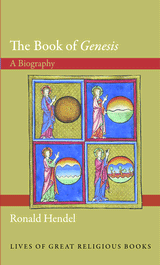“If it had been possible to build the Tower of Babel without ascending it,” muses Kafka, “it would have been permitted.” Kafka's slippery conditional distills the paradox of the Bible, affirming a divine ideal only to underscore the constraints of reality: transcendence is thinkable, not achievable. It is a vision of the human condition perched on the gap between the actual and the possible, on the fictional power of the Book. In The Book of Genesis: A Biography, Ronald Hendel, the Norma and Sam Dabby Professor of Hebrew Bible and Jewish Studies at the Department of Near Eastern Studies, traces the shifts in thought over millennia of reading the Bible. Genesis – in which the literary critic Auerbach identifies a modern sensibility for an “existential realism” – contains a collective history of how reality was perceived and handled and more specifically, argues Hendel, of how reading practices shaped perceptions of reality.
In Hendel’s story of the life and the afterlife of Genesis, the plot moves from figural to literal and back to figural again. Hendel begins with “the genesis of Genesis,” a palimpsest of motifs taken from ancient Near Eastern works and three source texts with varying conceptions of humans and God, e.g. an anthropomorphic, emotional deity who reacts to flawed, realistically portrayed humans or a transcendent, impassive deity who orders the cosmological structure of which humans are only a small part. Unpacking the compositional history, the laconic style and the public appearance of the Torah, Hendel accounts for the necessity of interpretation in a plural text full of obscure linguistic constructions and inconsistencies; yet, he explains, the early, figural readings were built on the assumption that the Bible is cryptic, relevant, perfect and divine. Throughout chapters 2, 3 and 4, Hendel demonstrates the intensely close ways that details were read - in an apocalyptic mode, a Platonic mode, or a curious blend of both for nearly two millenia - in order to decode the other, mystical order of reality.
The figural sense of Genesis breaks down throughout the medieval and early modern period as the dual reality gives way to a simpler conception of reality. Chapter 5, “Between the Figure and the Real,” shows that Luther’s rejection of allegory and insistence on the plain sense of scriptural words reflect his historical judgment about the original audience for whom Genesis was accessible; at the same time, Luther’s appeal to individual authority triggered an interpretive instability, Hendel notes, as reason came to an impasse with textual inconsistencies. The following chapter, “Genesis and Science” thoroughly lays out how challenges in the form of Galileo’s modern science, Spinoza’s historicism, the discovery of the New World outside the genealogical and geographical scope of the Bible, Darwinian evolution and Romantic subjectification of Genesis as a work of art eroded even the plain sense of Genesis.
According to Hendel, it was during this Gilded Age of America that fundamentalism first took hold, asserting the inerrancy of scriptural grammar and diction as a doctrinal position in itself. Plain sense is alone authoritative, but, in a telling strategic move, “where science and scholarship conflict with the plain sense of Scripture, it finds authority in a literal sense that is now hidden.” In the face of modern science and biblical scholarship, the populism and nostalgia of the American psyche expresses itself through a revival of the cryptic, figural Genesis: meaning is in the original, now lost in the historical past, and without a material existence, impervious to criticism.
Punctuated by explications of Rabelais, Kafka and Dickinson, the literary interest of Hendel’s biography returns to Auerbach’s study of Western literature. Hendel reminds us of the caveat that comes with the realist framework in Auerbach's history of representations: to read Genesis as a fiction is to stand outside the audience that the book seeks to instruct. Outside its authority, its realism becomes a magical realism, and we the readers become the exiled rebels. For Hendel, this is yet another layer of modern reality in which exilic reading alone sheds new light on the Book.
Visit the Biblio-file to view books that shaped Professor Handel's thinking while working on The Book of Genesis.
